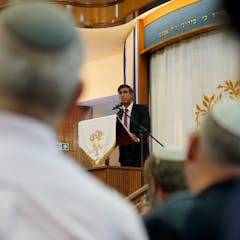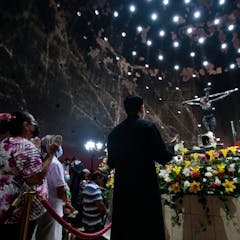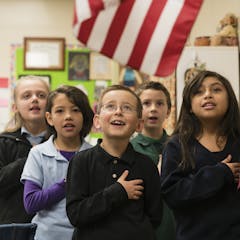
Articles on Religious freedom
Displaying 1 - 20 of 158 articles

The Central Asian nation has long figured among the ‘worst of the worst’ in regards to political and human rights. A new report shines light on cases of activists being seized and then going missing.

The language the UK government uses on faith-related subjects matters. It models – for everyone living in the UK – how to best engage with diverse manifestations of belief.

When President Daniel Ortega returned to power in 2006, church figures supported him. Violent repression after the 2018 protests has soured the relationship and made clergy targets for intimidation.

Does Louisiana’s requirement for public schools to post ‘In God We Trust’ in all classrooms violate the doctrine of separation of church and state? A legal scholar weighs in.

Using the rhetoric of the First Amendment, a string of US Supreme Court cases has allowed members of some religious groups to limit the freedoms of other Americans.

Catholicism, ‘Frenchness’ and secularism are often conflated in French culture, a scholar writes, while non-Christian traditions are viewed with suspicion.

The changes wrought by the new conservative majority in the US Supreme Court are revolutionary.

Distinct from civil disobedience, this legal strategy demands complete compliance with the law – even when there are loopholes that the laws’ creators didn’t intend.

The school’s approval may be the strongest challenge yet to limits on public money in religious schools.

As governments crack down at their borders, religious groups’ teachings to help the stranger remain unchanged.

The Supreme Court on June 29, 2023, changed the definition of ‘undue hardship’ so that employers have to accommodate more of workers’ religious requests.

Saying the state upholds universal principles does not act as a safeguard against institutional discrimination and racism.

Both cults and violent extremist movements have similar push and pull factors at the individual level.

Religious freedom has grown more important in US foreign policy – but does that come at the expense of promoting other human rights?

Ramadan is a time for prayer, charity and kindness to others. Having it celebrated in such a public way is empowering for Muslim communities across the country and beyond.

Using public funds to support students at private religious schools is one thing, but establishing faith-based institutions within public districts is another.

On the basis of government appointment technicalities and religious freedom, Americans may lose free coverage for cancer and blood pressure screenings, HIV prevention medication and other essential services.

Employers navigating employees’ requests for religious accommodations face some confusing guidance. A new Supreme Court case could clarify – and shift the norm.

The Supreme Court’s initial questions during the 303 Creative LLC v. Elenis opening arguments focused on whether the case might be premature, and what kind of discrimination is at play

Yeshiva University’s legal case has garnered national attention, but several similar cases are underway.
